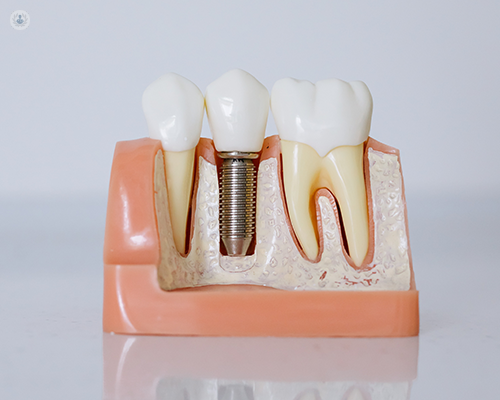Exploring the world of dental implants
Escrito por:Dental implants offer a reliable and long-lasting solution for replacing missing teeth, restoring function, and enhancing confidence in your smile.
Dr Kuljeet Mehta, renowned periodontist, delves into the world of dental implants, exploring what they are, the procedure involved, and essential care tips.

What are dental implants?
Dental implants are artificial tooth roots typically made of titanium. They are surgically placed into the jawbone to support replacement teeth such as crowns, bridges, or dentures. These implants provide a strong foundation for fixed or removable replacement teeth, mimicking the function and appearance of natural teeth.
What are the benefits of dental implants compared to other tooth replacement options?
Dental implants offer unmatched stability and durability compared to other tooth replacement options. Since they are anchored directly into the jawbone, they provide a strong foundation for replacement teeth, allowing for comfortable chewing and speaking without the worry of slippage.
Unlike traditional bridges, which mandate the shaving down of adjacent teeth for support, dental implants don’t rely on neighbouring teeth and operate independently. This preserves the integrity of adjacent teeth, reducing the risk of damage or decay in the future.
Lastly, dental implants stimulate the jawbone, preventing bone loss that typically occurs when teeth are missing. This aids in preserving facial structure and prevents the sunken appearance commonly linked with tooth loss.
Can dental implants be used to replace multiple missing teeth?
Dental implants offer an excellent solution for replacing multiple missing teeth. Dental implants can support bridges or dentures, providing a secure and stable restoration for patients missing several teeth in a row. This approach not only restores function and aesthetics but also helps preserve jawbone density, which may deteriorate in the absence of teeth.
What does the dental implant procedure consist of?
The dental implant procedure typically involves several steps.
Your periodontist will first conduct an initial consultation, which will involve a thorough examination of your oral health, including X-rays and impressions, to determine if you're a suitable candidate for dental implants.
During the dental implant procedure, the implant will be surgically placed into the jawbone beneath the gum tissue. In some cases, patients may require bone grafting to augment the jawbone if it lacks the necessary density to support the implant.
After the implant has been placed, a healing period of several months will then be necessary to allow the implant to integrate with the surrounding bone through a process called osseointegration.
Once the implant has fused with the jawbone, an abutment will be attached to the implant, protruding above the gumline. This will serve as the foundation for attaching the replacement tooth or teeth.
Lastly, custom-made crowns, bridges, or dentures will be attached to the abutments, restoring function and aesthetics to your smile.
Are there any potential risks or complications associated?
Like any surgical procedure, there are potential risks and complications to be aware of, including:
- Infection: Infection at the implant site is possible but rare. Proper oral hygiene and adherence to postoperative care instructions can minimise this risk.
- Implant failure: While uncommon, implants may fail to integrate with the jawbone or become loose over time. Factors such as smoking, poor oral hygiene, and underlying medical conditions can increase the risk of implant failure.
- Nerve damage: Placement of implants near nerves in the jawbone carries a slight risk of nerve damage, which may cause numbness or tingling in the surrounding areas. Your periodontist will take precautions to minimise this risk.
How should I care for my dental implants after the procedure?
Proper care is essential for maintaining the health and longevity of dental implants, including:
- Oral hygiene: Brushing and flossing around implants is crucial for preventing plaque buildup and gum disease. Additionally, regular dental check-ups and professional cleanings are also recommended.
- Healthy lifestyle: Quitting smoking and eating a balanced diet contributes to overall oral health and can enhance the longevity of dental implants.
- Regular maintenance: While dental implants are resistant to decay, the surrounding gum tissue is still susceptible. Regular monitoring by your periodontist is essential for early detection and treatment of any issues that may arise.
How long do dental implants last?
With adequate care and maintenance, dental implants can last a lifetime. However, factors such as oral hygiene, overall health, and lifestyle habits can influence their longevity. Routine dental visits and adherence to postoperative care instructions can help ensure the success and longevity of your dental implants.
If you’re considering dental implants, schedule an appointment with Dr Kuljeet Mehta via his Top Doctors profile today.


